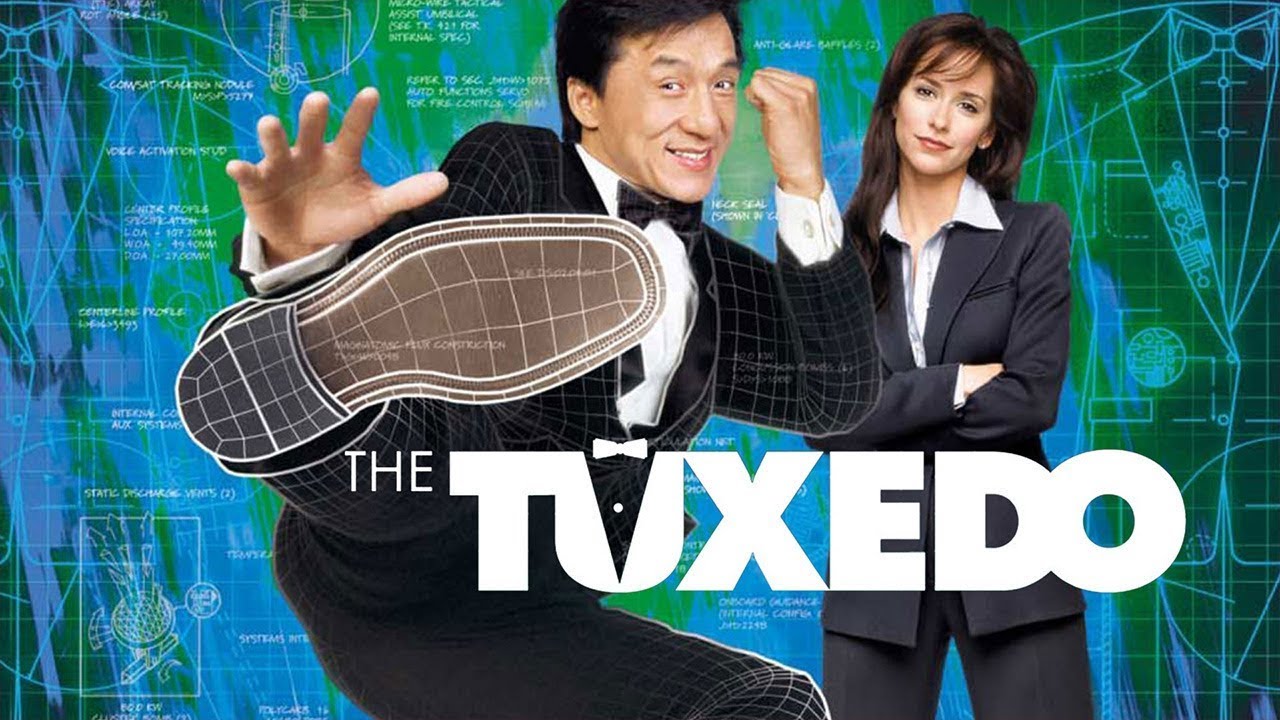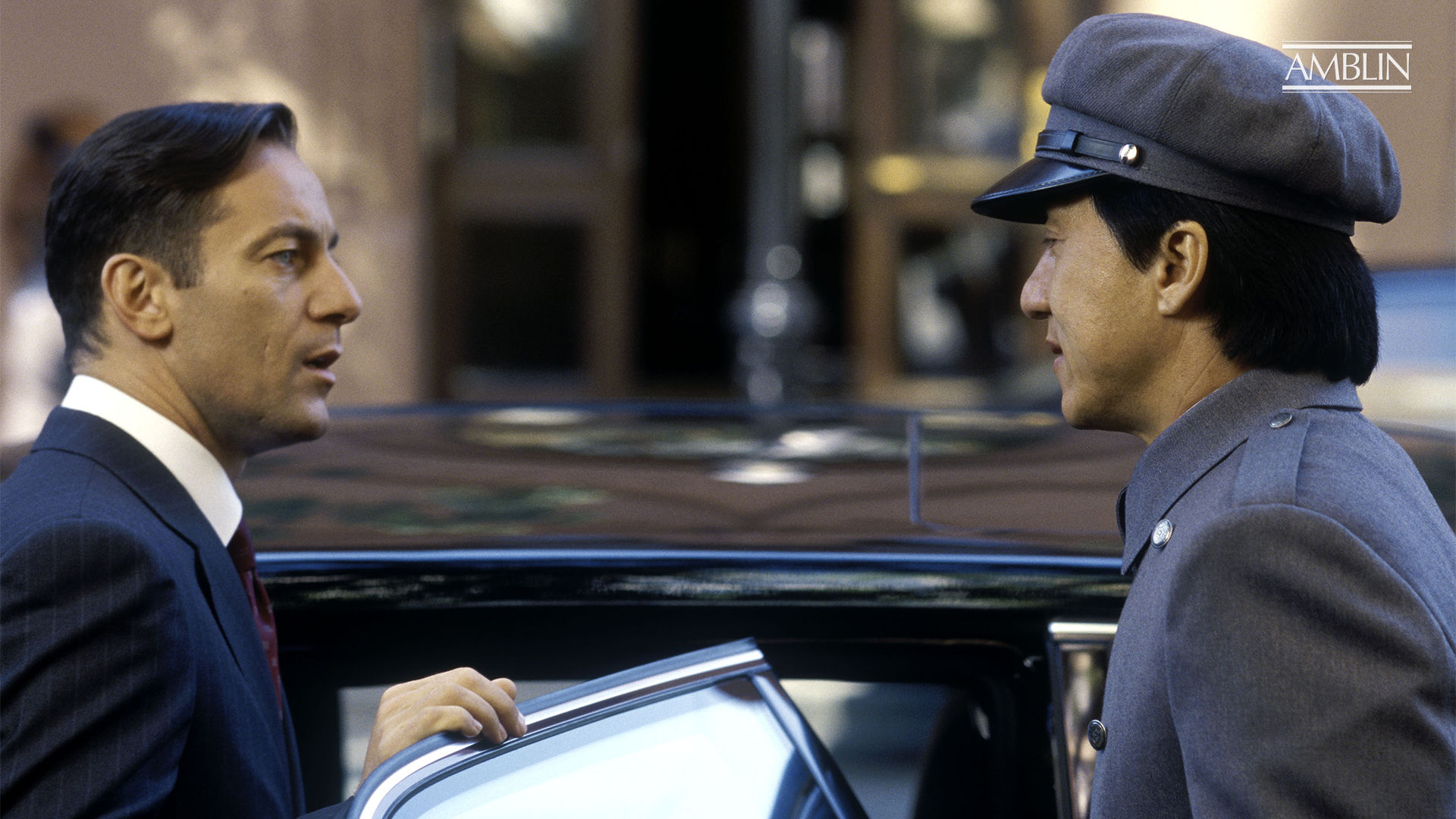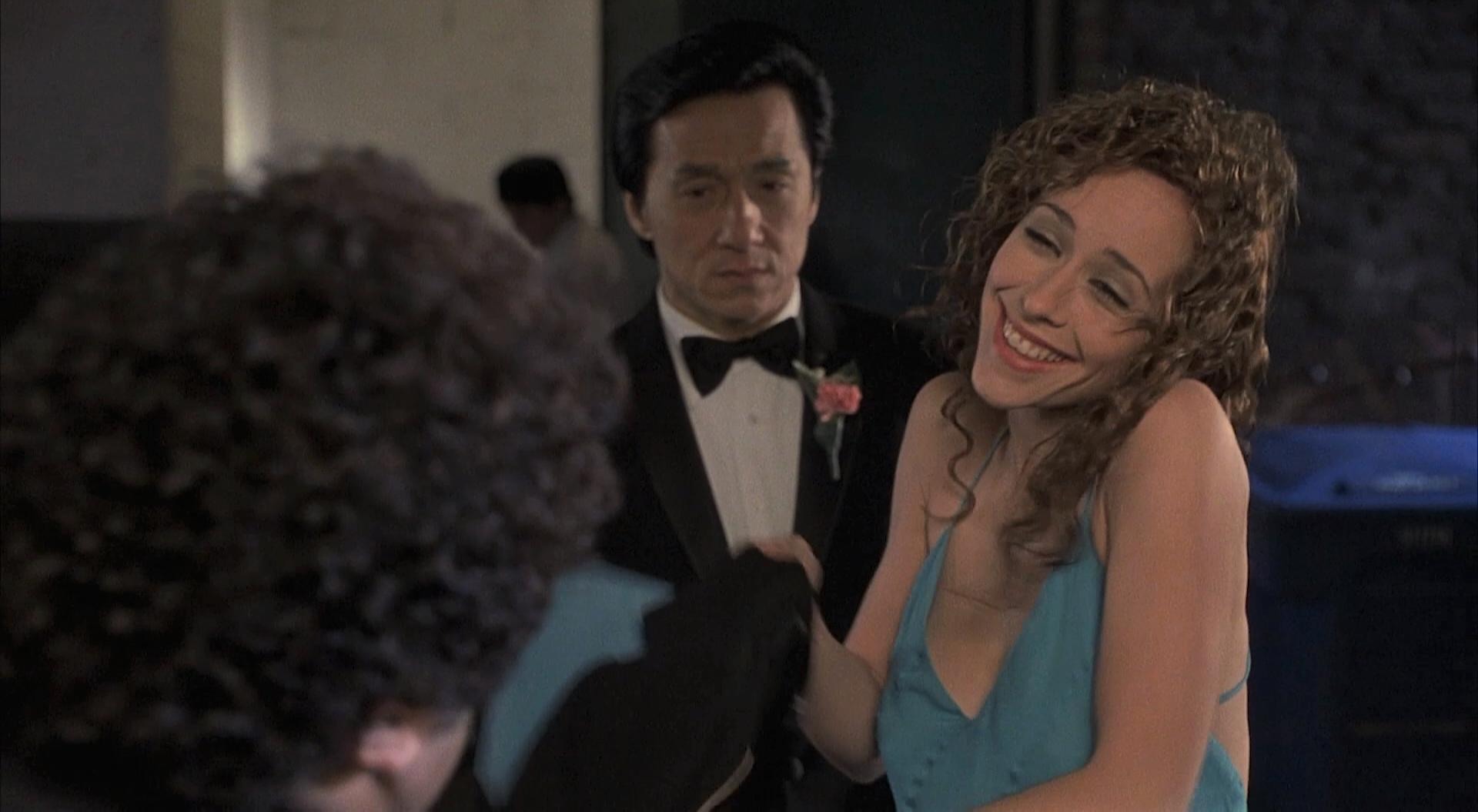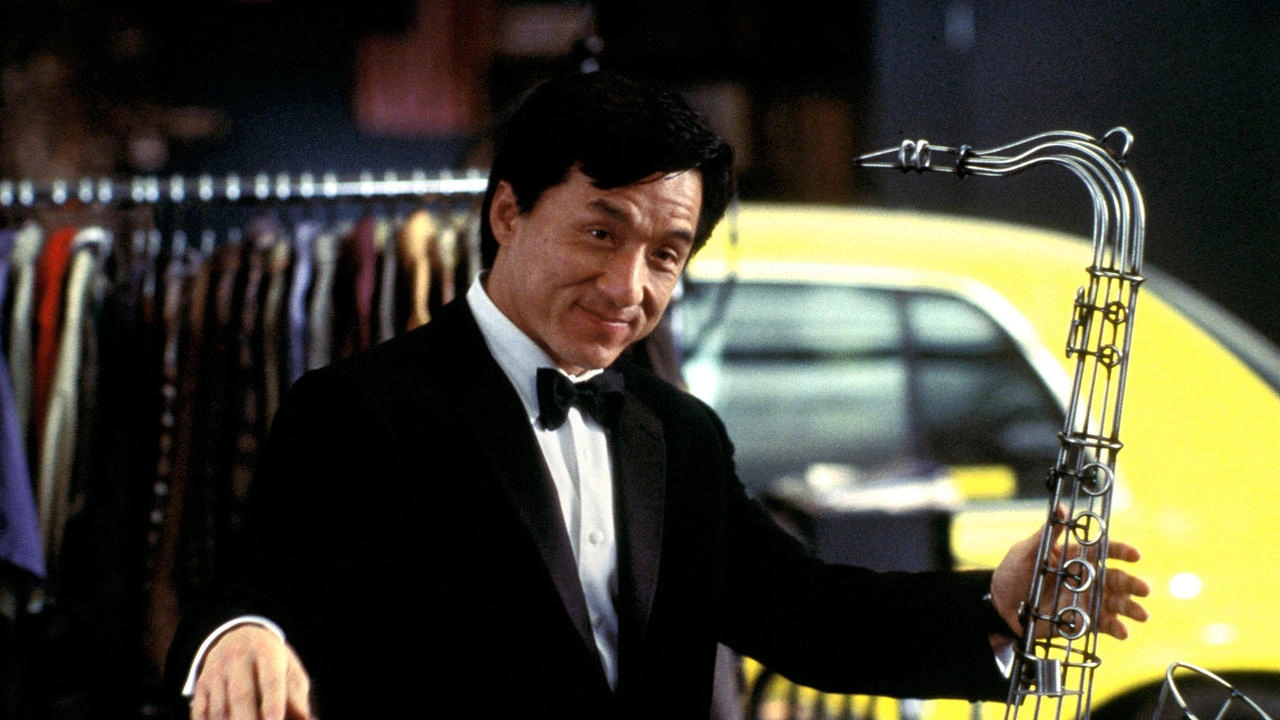🎩 The Tuxedo (2002)

Movie Review: The Tuxedo (2002)
The Tuxedo (2002) is an action-comedy film directed by Kevin Donovan, starring Jackie Chan and Jennifer Love Hewitt. The film follows a mild-mannered, clumsy chauffeur named Jimmy Tong (Jackie Chan) who accidentally finds himself in possession of a high-tech tuxedo that grants its wearer extraordinary abilities. These abilities, however, come at a price, as Jimmy is thrust into a world of espionage and danger that he is woefully unprepared for.
This review explores the film’s narrative, character development, performances, technical execution, and overall appeal, taking a critical look at its successes and shortcomings.
Plot Overview
At its core, The Tuxedo is a classic “fish-out-of-water” story. Jimmy Tong, a simple man who works as a chauffeur for a wealthy businessman, finds his life turned upside down when his boss, Clark Devlin (Jason Isaacs), is mysteriously attacked and rendered unconscious. In an attempt to take over his boss’s job, Jimmy tries on Devlin’s custom-made tuxedo, which turns out to be far more than just a fancy suit.
The tuxedo, created by a mysterious company, is equipped with state-of-the-art technology that enhances Jimmy’s physical abilities to superhuman levels. With the help of a novice secret agent named Del Blaine (Jennifer Love Hewitt), Jimmy embarks on a mission to prevent a global disaster orchestrated by a villainous mastermind (Ritchie Coster), all while struggling to control his newfound powers.
Narrative and Pacing
The narrative of The Tuxedo is largely predictable, following many of the typical tropes of action-comedy films. Jimmy’s transformation from a bumbling, incompetent chauffeur to a suave and capable secret agent is both entertaining and familiar. The film plays heavily on the comedic potential of Jackie Chan’s physicality, blending it with spy tropes in a way that feels reminiscent of the 007 films, though with far less sophistication and a lot more humor.
However, despite its predictable plot, The Tuxedo doesn’t take itself too seriously. The film embraces its absurdity, particularly through the tuxedo’s ludicrously exaggerated features. The pacing is brisk, and the action scenes are filled with slapstick humor, though they also contain enough adrenaline-pumping sequences to keep viewers engaged.
The film does falter at times in its attempt to balance action and comedy, occasionally feeling like it lacks emotional depth or strong stakes. The relationships, especially between Jimmy and Del, seem more like a subplot rather than a driving force for the story. While it offers some emotional moments, they feel fleeting in the context of the film’s otherwise lighthearted tone.
Character Development and Performances
Jackie Chan is undoubtedly the highlight of The Tuxedo. His comedic timing and martial arts prowess are on full display, as he deftly navigates the physical demands of the role. Chan is known for his unique blend of physical comedy and action, and The Tuxedo offers plenty of opportunities for him to showcase his skills. Whether he’s dodging bullets or making use of the tuxedo’s gadgets, Chan brings a level of charm and humor that elevates the film. The sight of him trying to navigate a tuxedo that he can’t quite control is both absurd and hilarious, and his ability to execute stunts while maintaining a comedic sensibility is nothing short of impressive.
Jennifer Love Hewitt’s role as Del Blaine, a rookie agent who teams up with Jimmy, is somewhat underdeveloped. While she provides a level of competence and support, her character is often overshadowed by Jimmy’s antics. Del is portrayed as the straight-laced foil to Jimmy’s comedic persona, but the chemistry between her and Jackie Chan feels a bit lacking. While she holds her own in action scenes, the film could have benefited from further fleshing out her character. That said, Hewitt delivers a solid performance within the confines of the script and does her best to match Chan’s energy.
Jason Isaacs plays the enigmatic Clark Devlin, though his character has little screen time due to his incapacitation early in the film. He adds a touch of sophistication to the role, though his involvement feels more like a plot device than a developed character. The film’s villain, played by Ritchie Coster, is suitably menacing, but lacks the complexity that would have made him truly memorable. His motivations are thin, and his role largely serves to drive the action forward rather than offer any meaningful philosophical conflict with the protagonists.
Comedy and Action
Where The Tuxedo truly shines is in its action-comedy blend, which is a hallmark of Jackie Chan’s films. The action sequences are kinetic and fun, though they aren’t as finely choreographed as some of Chan’s more iconic works. The tuxedo itself becomes a tool for both action and comedy, as Jimmy uses its gadgets in increasingly ridiculous and inventive ways. From automated shoe laces to a tuxedo that can morph into various forms, the film’s humor is derived from the outlandish technology and Jimmy’s mishaps as he tries to use it.
Chan’s trademark slapstick humor is evident throughout, with physical gags that rely on timing and choreography. The sequences where Jimmy struggles to control the tuxedo are some of the film’s funniest moments. There’s an undeniable charm to seeing a seemingly ordinary man transformed into an action hero, especially when that man is played by Jackie Chan, who is both an accomplished martial artist and a comedic genius. His interactions with the various gadgets are delightful, if not always believable, and they offer plenty of laughs for viewers looking for lighthearted fun.
The film’s comedic tone is balanced with bursts of action, though it’s clear that the comedy takes precedence over intense fight choreography. That said, the film’s lighter action sequences still provide a fun spectacle, even if they lack the polish and finesse seen in more serious spy thrillers.
Technical Aspects
Visually, The Tuxedo isn’t groundbreaking, but it is competent in its execution. The film’s production design leans heavily on the idea of high-tech gadgets and espionage, and the tuxedo itself is a standout element in the film’s visual identity. The gadgetry and futuristic elements are showcased with enough flair to make them entertaining, though they do not push the envelope in terms of innovation or realism.
The special effects, particularly in the action scenes, are serviceable but not particularly impressive. The tuxedo’s abilities—such as transforming into a race car or providing superhuman strength—are a fun visual element, but they rely heavily on CGI, which sometimes feels dated or overdone. The film’s editing, especially during the action scenes, is designed to create a sense of chaos and humor, cutting quickly between Jimmy’s antics and his inability to fully control the tuxedo. It’s a fun ride but never quite as polished as more high-budget action films.
The film’s soundtrack is appropriately upbeat, supporting the whimsical tone of the movie. The music enhances the action scenes and adds to the film’s lighthearted atmosphere. However, the score is not particularly memorable and fades into the background, never overshadowing the primary action and comedy.
Cultural Impact and Legacy
The Tuxedo was released at a time when the spy genre was still riding the wave of 007’s resurgence, and films like Austin Powers had popularized the comedic side of espionage. Jackie Chan’s presence in Hollywood was becoming more established, but he had yet to find a truly mainstream role that resonated with audiences in the way his Hong Kong films had. The Tuxedo served as an attempt to merge his action stardom with a family-friendly, Western-oriented product.
Despite this, The Tuxedo was not a massive box office success. It performed moderately well but didn’t create the lasting cultural impact of some of Chan’s other films, such as Rush Hour. The film has since found a niche audience, particularly among fans of Jackie Chan and those who enjoy light action-comedies. However, it remains a lesser-known entry in his filmography, overshadowed by his more iconic works.
Conclusion
The Tuxedo (2002) is an enjoyable, if somewhat forgettable, action-comedy that benefits from Jackie Chan’s presence but suffers from a predictable plot and underdeveloped characters. The film’s strength lies in its humor and the physicality that Chan brings to the role, as well as the inventive use of the tuxedo’s gadgets. While the film may not stand as one of Jackie Chan’s best works, it provides a fun and lighthearted escape for viewers looking for a simple, entertaining ride.
In the end, The Tuxedo is a popcorn flick that delivers what it promises: action, comedy, and Jackie Chan’s signature style. It doesn’t break new ground, but it offers enough laughs and thrills to make it a worthy watch for fans of the genre.











